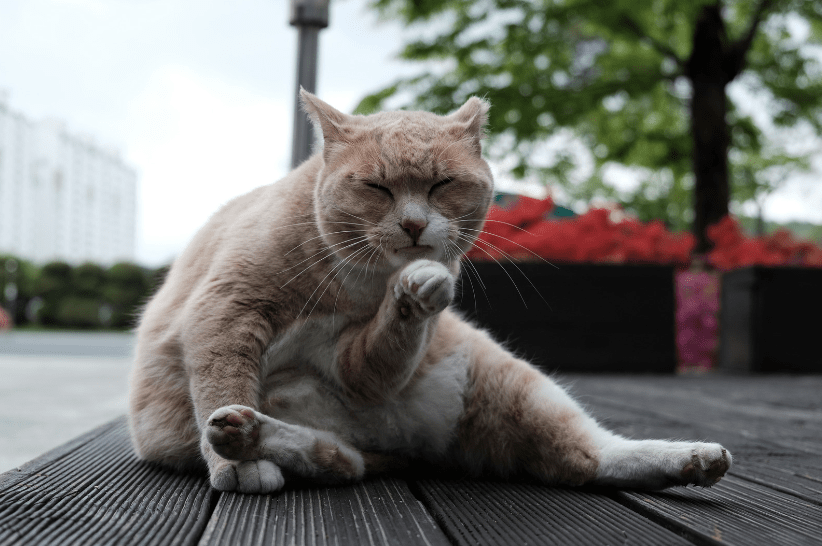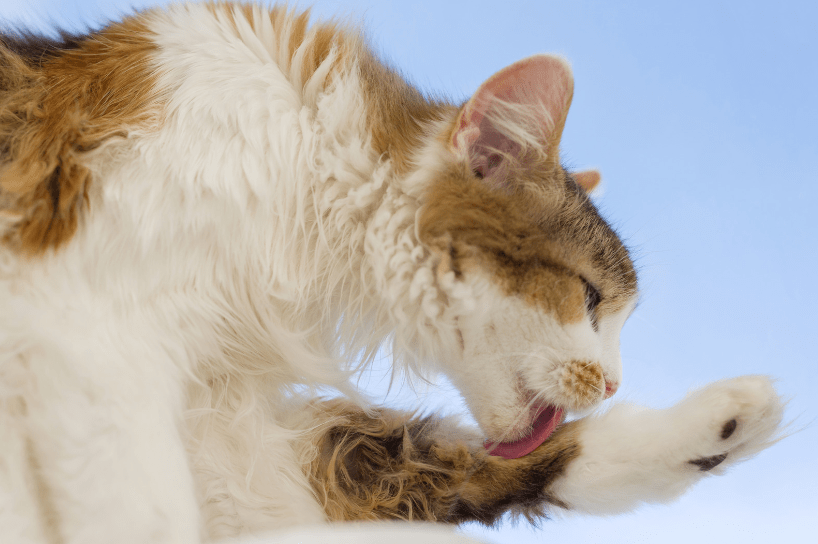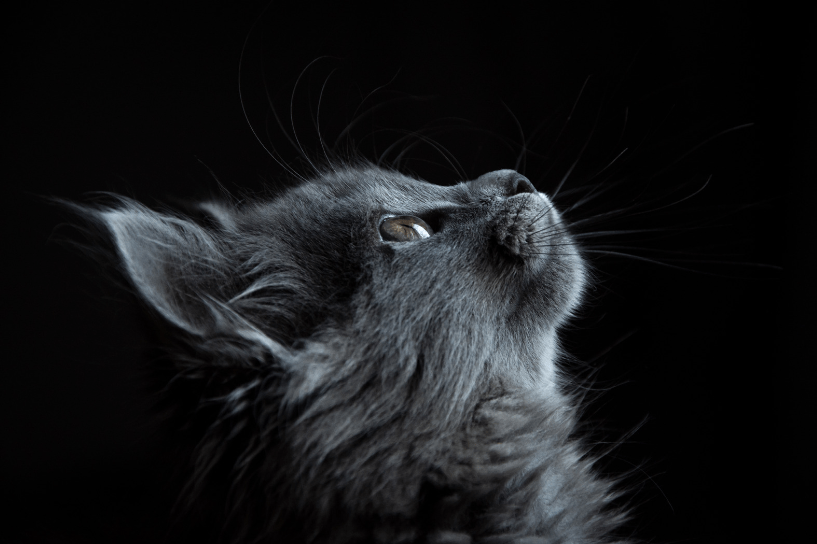Cats lick themselves after you pet them to groom and clean their fur. This behavior is instinctual and helps them maintain hygiene.
Cats have an instinct to keep their fur clean, and licking themselves is their way of grooming. When you pet a cat, their natural grooming instinct is triggered, and they lick themselves to remove your scent and restore their own.
Additionally, licking helps distribute their natural oils throughout their fur, keeping it healthy and shiny. This behavior also helps cats remove any loose fur, dirt, or debris that may have accumulated while being petted. So, the next time you see your feline friend indulging in a post-petting self-cleaning session, you now know it’s just their way of maintaining their hygiene and overall well-being.
Understanding Cat Grooming Behavior
Have you ever noticed that your feline companion immediately starts grooming themselves after you give them a friendly pet? It’s a common behavior among cats, and there are a few reasons behind this peculiar habit. In this article, we will delve into the world of cat grooming behavior to understand why cats lick themselves after being petted.
The Importance Of Grooming
Grooming plays a vital role in a cat’s life. Not only does it help to keep their fur clean and free of dirt and debris, but it also helps them maintain their body temperature. Cats have a unique grooming routine that involves licking their fur, which not only keeps their coat well-groomed but also stimulates blood circulation.
Grooming also serves as a way for cats to maintain their social bonds and establish their territory. It is a form of communication that signals to other cats their presence and ownership of an area.

An Innate Behavior
Grooming is an innate behavior that kittens learn from their mother at a very young age. It is an instinct that is hardwired into their DNA. As they grow, they develop a strong grooming routine that becomes an integral part of their daily activities.
Cats are meticulous groomers, spending a significant portion of their waking hours cleaning themselves. They have specialized papillae on their tongues that act like tiny bristles, effectively combing through their fur and removing any tangles or loose hair. Not only does this grooming process keep their coat in pristine condition, but it also helps cats to relax and relieve stress.
Why Cats Groom Themselves
Cats groom themselves for various reasons. One of the main reasons is that grooming helps cats to remove unwanted scents and potential threats from their fur. When you pet your cat, your scent gets transferred onto their fur, and they instinctively groom themselves to remove it. This is their way of masking any foreign scents and restoring their natural smell.
Another reason cats groom themselves after being petted is to ensure that their fur is aligned correctly. When we stroke our cats, their fur can become disheveled. By grooming themselves, cats can realign their fur and restore its natural smoothness. Additionally, the act of grooming releases natural oils from their skin, which helps to keep their coat healthy and shiny.
It’s important to remember that each cat is unique, and their grooming habits may vary. Some cats may groom themselves more vigorously than others, while some may prefer to groom in private. As cat owners, we should embrace and appreciate their grooming behavior, as it is an essential part of their overall well-being.
The Bond Between Cats And Their Owners
Cats lick themselves after being a pet to clean and groom, a natural behavior rooted in their wild instincts. This self-grooming strengthens their bond with their owners, showing trust and affection.
Cats As Independent Animals
When it comes to understanding the behavior of our feline friends, it’s important to recognize that cats are inherently independent creatures. Unlike dogs who rely heavily on social interaction with their owners, cats have a unique sense of autonomy. They can be affectionate and loving, but they also value their personal space. This independence is a part of their innate nature, a remnant of their ancestral lineage as solitary hunters.
Establishing Trust Through Petting
As cat owners, we have the privilege of building a strong bond with our furry companions. One way we establish trust and affection is through petting. When we stroke our cats’ fur gently, it releases endorphins that promote relaxation and contentment. This physical interaction also mimics grooming, which is a fundamental part of social bonding in the feline world. In essence, petting a cat is a way to communicate love and care, creating a sense of security and belonging.
Licking As A Social Behavior
After petting our cats, we may observe them immediately licking themselves. While you might think this behavior is simply a cleaning ritual, it serves a deeper purpose. Licking is a social behavior in cats, demonstrating their acceptance of our affection. When cats groom themselves, they are not only maintaining their hygiene, but they are also spreading their scent, marking themselves as members of our family unit. This scent exchange solidifies the bond between the cat and the owner, allowing them to identify themselves as part of our social circle.
Furthermore, licking is an instinctual response to stress or anxiety. If a cat feels overwhelmed or overstimulated by intense petting, they may resort to licking themselves as a way to self-soothe. It is essential to be attuned to our cats’ signals and respect their boundaries, understanding that every individual cat has unique preferences when it comes to physical contact.
In conclusion, the bond between cats and their owners is built upon a delicate balance of mutual respect and affection. By recognizing and understanding their independent nature, establishing trust through petting, and acknowledging the significance of licking as a social behavior, we can deepen our connection with these fascinating creatures.
The Comfort Factor
Cats lick themselves after you pet them to restore their comfort and cleanliness, as it helps in aligning their fur and removing any unwanted scents or oils that might have transferred during the interaction. It is a natural grooming behavior that reflects their instinctual need for personal hygiene.
When it comes to furry feline friends, there’s no denying their obsession with personal grooming. One peculiar behavior that often leaves cat owners puzzled is why cats lick themselves after being petted. It turns out that this post-petting ritual serves as a way for cats to find comfort and reassurance. Offering vital insights into your cat’s behavior, this article delves into the comfort factor behind why cats engage in such behavior. Exploring the H3 headings of “Calming Themselves Down” and “Relieving Stress and Anxiety,” we’ll uncover the fascinating reasons behind your feline companion’s self-grooming habits.
Calming Themselves Down
You may have noticed that after you shower your cat with affection, they immediately start licking themselves. This response is a form of self-soothing, allowing them to calm down after being touched. While this might seem counterintuitive at first, it’s important to remember that cats are extremely sensitive creatures. Petting can stimulate their senses and create a touch overload, causing them to feel overexcited or overwhelmed. By licking themselves, cats redirect their focus to an activity that brings them comfort. In a sense, it’s their way of “resetting” and regaining control over their emotions.
Relieving Stress And Anxiety
In addition to calming themselves down, cats also use self-grooming as a means to relieve stress and anxiety. Stressors can vary from environmental changes to social dynamics within a multi-pet household. When your cat licks themselves after being petted, it serves as a coping mechanism to alleviate any unease they may be feeling. By focusing on the repetitive motion of grooming, cats can redirect their anxious energy and find solace in the familiarity of the action.
It provides them with a sense of control and security, reassuring them that they have a way to cope with stressful situations. Understanding why your cat licks themselves after you pet them is crucial in comprehending their needs and emotions. While it may seem unusual at first, their grooming behavior goes beyond mere hygiene. By delving into the comfort factor of self-grooming, we can witness the fascinating ways in which cats find solace and peace in their unique way.
The Scent Marking Hypothesis
After you pet them, cats lick themselves as part of the scent-marking hypothesis. This behavior helps them leave their scent and reclaim their territory.
Have you ever wondered why cats often lick themselves immediately after you finish petting them? This peculiar behavior can be explained by the scent marking hypothesis. This theory suggests that cats engage in self-grooming as a way to transfer their scent, mark their territory, and feel secure in their environment.
Transferring Their Scent
One reason why cats lick themselves after being petted is to transfer their scent. When you stroke your cat’s fur, you leave behind your own scent. By licking themselves, cats aim to remove your scent and replace it with their own. This behavior asserts their ownership of their body and leaves a trace of their unique scent behind.
Marking Their Territory
Licking is a form of marking territory for cats. As they groom themselves, cats distribute their saliva, which contains chemical messages known as pheromones. These pheromones communicate vital information to other cats, such as their presence, social status, and readiness for mating. By marking their bodies, cats establish a sense of territory and assert their place in the hierarchy of their environment.
Furthermore, when cats lick themselves, they also spread their scent in the immediate surroundings. This acts as a warning sign to other cats, indicating that the area has already been claimed. In multi-cat households, this behavior helps maintain boundaries and prevent potential conflicts over resources.
Feeling Secure
In addition to transferring their scent and marking territory, cats lick themselves after being petted as a way to feel secure. Grooming provides cats with a sense of comfort and familiarity in their surroundings. It helps them calm down and reduces any stress or anxiety they may have experienced during the interaction with their human.
Moreover, self-grooming increases the release of endorphins, which are natural feel-good chemicals. This pleasurable sensation reinforces the behavior, making cats more likely to continue licking themselves even after your loving attention.
In conclusion, the scent-marking hypothesis offers an insightful explanation for why cats lick themselves after you pet them. By transferring their scent, marking their territory, and feeling secure, cats engage in this grooming behavior as a way to assert their ownership, communicate with other cats, and find comfort in their environment.

Stimulating The Natural Cleaning Process
Cats lick themselves after being petted to stimulate their natural cleaning process, ensuring their fur remains clean and shiny.
Covering Up Human Scent
One of the reasons why cats immediately start licking themselves after being petted is to cover up the human scent that has been transferred onto their fur. As independent creatures, cats are territorial and rely on their scent to mark their belongings and territory. When you pet a cat, your scent gets transferred onto their fur, and this could be considered an intrusion into their personal space. To reclaim their territory, cats lick themselves to remove the foreign scent and reestablish their familiar scent.
Removing Unwanted Substances
Another reason why cats engage in immediate self-licking after petting is to remove any unwanted substances that may have accumulated on their fur. While you may have clean hands, there could still be microscopic dirt particles, oils, or other substances that can cling to a cat’s fur during the petting process. Licking is a natural cleaning mechanism for cats. It helps them to remove any foreign substances from their fur, ensuring that they maintain a pristine and healthy coat.
Maintaining A Clean And Healthy Coat
In addition to covering up human scent and removing unwanted substances, licking themselves after being petted also helps cats maintain a clean and healthy coat. Cats are meticulous groomers, and licking serves as an essential part of their grooming routine. By licking their fur, they distribute natural oils, remove dead hair, and stimulate blood circulation to the skin. This not only keeps their coat in good condition but also helps to prevent mats and tangles from forming.
Furthermore, the act of licking also provides a calming effect for cats. This self-grooming behavior helps to reduce stress and anxiety, making them feel more secure and content. So next time you wonder why your feline friend starts grooming themselves after you pet them, remember that it’s their way of maintaining cleanliness, asserting their territory, and finding comfort.
The Necessity Of Grooming
Cats lick themselves after being petted as a form of grooming. This behavior helps maintain their fur’s cleanliness, prevents matting, and stimulates oil production for a healthy coat.
Preventing Matting And Tangles
Cats are meticulous groomers, and one of the reasons why they lick themselves after you pet them is to prevent matting and tangles in their fur. By licking their fur, they remove any loose hairs and keep it in good condition.
Keeping The Skin Clean
Another reason why cats lick themselves is to keep their skin clean. Their rough tongue acts as a natural brush, removing any dirt, debris, or foreign particles that may have accumulated on their coat while being petted. This grooming action helps to maintain the overall hygiene and health of their skin.
Maintaining Body Temperature
Cats are also experts at maintaining their body temperature, and grooming plays a vital role in this process. When a cat licks its fur, its saliva evaporates, causing a cooling effect on the skin. This activity helps them regulate their body temperature, especially during hot weather.
To summarize, the reason why cats lick themselves after you pet them is due to the necessity of grooming. They do this to prevent matting and tangles in their fur, keep their skin clean, and maintain their body temperature. Cats are instinctively aware of the importance of grooming and use it as a means to ensure their coat stay in optimal condition and their overall well-being is maintained.
When Licking Becomes Excessive
Cats may groom excessively after being petted as a way to remove your scent and restore their own. This behavior is natural, but if it becomes obsessive, it could signal an underlying issue such as stress or allergies.
Causes Of Overgrooming
When a cat starts to excessively lick themselves after being petted, it could be a sign of overgrooming. Overgrooming is a common behavior in cats and can have several causes. It is important to understand these causes to address the issue effectively. There are various reasons why cats may engage in overgrooming. Some cats may simply find the sensation of being petted pleasurable and continue to groom themselves as a way to prolong the enjoyment. Others may be trying to remove the scent of the person who petted them, as cats are known to be territorial animals.
Potential Health Issues
While some grooming is normal for cats, excessive licking can be a sign of underlying health issues. Cats may overgroom themselves if they are experiencing discomfort or pain, such as allergies, skin infections, or parasites. It is important to monitor your cat’s overall health and look for any unusual signs or symptoms. Additionally, stress or anxiety can also lead to excessive grooming in cats. Cats are known to be sensitive creatures, and changes in their environment or routine can cause them to feel stressed or anxious. This can manifest in excessive grooming as a way for them to cope with their emotions.
Addressing Compulsive Behavior
If you observe that your cat is excessively licking themselves after being petted, it is essential to address this behavior and ensure your feline friend’s well-being. Here are a few strategies to help with compulsive grooming:
- Identify and address any potential health issues: Take your cat to a veterinarian for a thorough examination to rule out any underlying health concerns. Treating any medical conditions promptly can help alleviate the excessive grooming behavior.
- Provide environmental enrichment: Cats need mental and physical stimulation to keep them happy and engaged. Make sure your cat has plenty of toys, scratching posts, and interactive playtime to reduce boredom and anxiety.
- Manage stress and anxiety: Create a calm and secure environment for your cat. Provide them with a designated space where they can retreat when they feel overwhelmed. Consider using pheromone diffusers or calming supplements to help reduce their anxiety.
- Redirect their attention: When you notice your cat starting to excessively groom themselves, distract them with interactive toys or gentle petting in a different area. Encouraging alternative behaviors can help break the grooming cycle.
Remember, excessive grooming can be a sign of an underlying issue, so it is important to consult with a veterinarian if the behavior persists. By understanding the causes and addressing them appropriately, you can help your cat lead a happier and more comfortable life.
Conclusion
Cats licking themselves after being petted is a natural behavior rooted in their grooming instincts. It helps them restore the scent of their coats, maintain cleanliness, and promote relaxation. Understanding this feline habit can strengthen the bond between pet and owner.
By recognizing the reasons behind this behavior, we can appreciate their fascinating feline nature even more. So, next time your cat engages in this grooming ritual, know that it’s just their way of keeping themselves well-groomed and content. Embrace this quirky behavior and enjoy the unique bond you share with your feline companion.






